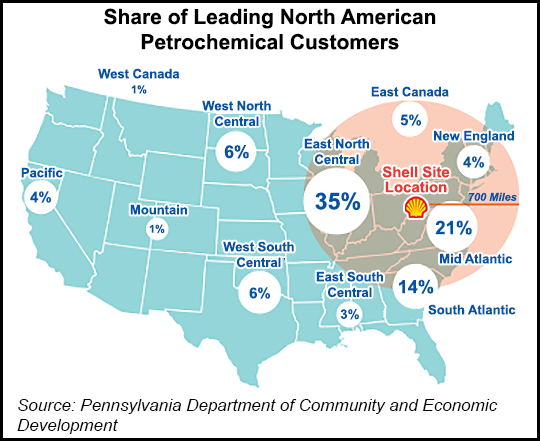Shale Daily | Infrastructure | NGI All News Access | NGI The Weekly Gas Market Report
In Bright Spot, Some Jobs Returning at Shell Pennsylvania Cracker
More workers are back at Royal Dutch Shell plc’s ethane cracker site in Western Pennsylvania this week after the state said they were exempt from an order last month shutting down nonessential businesses to curb the spread of Covid-19.

Because of the pandemic, Shell last month temporarily suspended work on the project and sought a waiver to continue with some work. However, the Pennsylvania Department of Community & Economic Development (DCED) said those building the cracker’s power plant could go back to work. A waiver “is not required for such activity insofar as it directly supports electrical power generation, transmission and distribution,” DCED spokesperson Rachel Wrigley said.
After it shuttered the massive project, a few hundred workers were kept on site for maintenance and other critical duties. About 500 workers are expected back this week. Since construction started in 2017, more than 8,000 workers have contributed to the project, with more than 6,000 at the site when Shell suspended construction in March.
While oil and gas extraction, transportation and distribution were allowed to continue as essential services, along with power generation and chemical manufacturing operations, most construction across the state was halted, forcing projects to seek waivers to continue.
Mariner East, another key natural gas liquids pipeline project, was cleared to restart some work last month, mainly related to preventing adverse public health and environmental impacts at certain locations. Shell’s Falcon Ethane Pipeline system, which would move 100,000 b/d to its cracker in Beaver County, about 30 miles northwest of Pittsburgh, also was allowed to continue with construction.
The cracker would be capable of producing 1.5 million metric tons/year (mmty) of ethylene and another 1.6 mmty of polyethylene. Three onsite natural gas-fired turbines are being installed to generate electricity and steam, with excess electricity slated to be sold to the wholesale power market.
Pennsylvania’s unemployment rate reached 6% in March, up nearly 2% from the same time. Spokesman Kurt Knaus, of the Pennsylvania Energy Infrastructure Alliance, said with “the state economy in a meltdown,” allowing laborers to get back to work on certain projects was a positive sign.
“Pipeline and utility work, including critical construction and maintenance, are essential for public well-being,” Knaus told NGI’s Shale Daily. “What many don’t realize is that pipelines like Mariner East, for example, deliver products that are essential components to transportation fuels and heating fuels, and its byproducts provide the feedstock to manufacture medical supplies and personal protective equipment. So these projects aren’t simply critical to our economy overall and the energy sector specifically; they touch every aspect of our modern life.”
The state’s pipeline buildout has slowed in recent years, but infrastructure remains important as Pennsylvania produced 6.8 Tcf last year. While Mariner East and the ethane cracker are among the state’s leading energy projects, it’s been difficult to gauge the shutdown’s impacts on other energy infrastructure work there.
Wrigley told NGI that “due to the variability of projects” the state can’t comment generally on specific construction exemptions.
“That is our understanding as well,” Knaus added. “While the state may be granting waivers, they are not announcing them, so the only way we know about waivers is when a company or businesses announce that they received one and will resume work. This would apply to larger lines as well as gathering lines. Keep in mind, however, that most oil and gas operations remain operational as essential and life-sustaining businesses.”
© 2024 Natural Gas Intelligence. All rights reserved.
ISSN © 2577-9877 | ISSN © 1532-1266 | ISSN © 2158-8023 |
